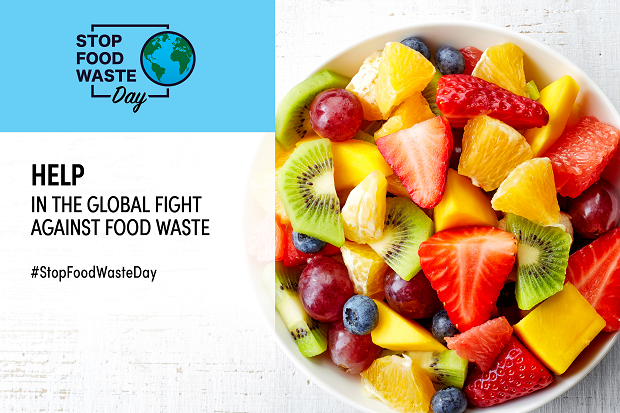
On Stop Food Waste Day, User Support and Training Manager Dom Burton reflects on why he feels the need for us all to reduce our food waste is so critically important to the future of the planet.
It’s Stop Food Waste Day today - the largest single day of action in the fight against food waste - and I wanted to share why I think it’s important that we all try and reduce our food waste.
I blogged last year about why I have an allotment, and the role allotments play in helping people to live healthier lifestyles, to grow their own food, and to help bolster communities.
We waste an estimated 1.3 billion tonnes of food every year - around one third of all food produced for human consumption. That’s a truly staggering and sobering statistic.
A challenge for all of us
Food waste is central to some of the key challenges facing the world today, including hunger and poverty, climate change, habitat destruction, decreased biodiversity and overuse of land and water.
It also wastes the precious (and increasingly expensive) energy that we use to grow, harvest, process and cook, and food waste in landfills can cause methane emissions, a potent greenhouse gas.
To combat the climate emergency and help protect our environment, we all need to reduce the amount of food we waste.
Working in Defra has, I guess, made me much more aware of these issues, and how they all connect together. Sustainability and waste reduction runs through everything we do. Whether that’s how we design and manage IT products and services, as our Chief Digital and Information Officer Chris Howes wrote about at COP27, or through strategies like the National Food Strategy, which looks at the entire food chain, from field to fork.

‘Waste not want not’ still applies today
Growing up, I was raised to ‘waste not, want not’ by my mum. She’s a great cook and I have her to thank for my passion and interest in food. She taught me how to be thrifty with food, to make the most of every ingredient (like making soup after having a roast chicken), and how to make the most of what’s in the fridge and store cupboard.
When I cook these days, I tend to plan my meals in advance so I can get all the ingredients I need at the shops. I cook food that usually will feed me for several meals (freezing or chilling leftovers batched up in portions). As well as saving money on energy, this helps me to only buy what I need and minimises the risk of food waste.
Last year was our first year running the allotment - we took it on at the end of March 2022, after being on the waiting list for about a year. We’ve had so much enjoyment (and food!) from it already in the space of just a year.
On the allotment we try and grow our own fruit and vegetables for some of the year. We’re currently getting all our seedlings ready for planting in the greenhouse. For some of the year it means I won’t need to buy potatoes, beans, onions, tomatoes, lettuce, sweetcorn, or leeks.
Although this doesn’t help with food waste from shops, it does help reduce food waste by ensuring we only harvest what we need. It also makes me feel thriftier. My mum approves anyway!
A few simple but effective tips for you to try:
- I use the app Too Good To Go which allows businesses near me with food close to the expiry date to list ‘surprise bags’ on the app at discounted rates – you buy the bags and get the contents the same day. There’s a really good butcher near me who participates in the scheme, and I’ve had some really great value bags from them. Why not check out who’s participating near where you live? It’s a great way of reducing food waste.
- This digital ‘food waste’ cookbook for home cooks, features simple recipes from across 30 countries, which give a second life to ingredients that most commonly go to waste in home kitchens, including stale bread, bruised fruit & vegetables, and discarded peels. We can all easily have a go at replicating these recipes at home.
- Plan ahead, don’t overbuy, batch-cook and freeze portions, experiment with what you have in the fridge, use odd bits of vegetables to make wholesome soups (you can buy a basic soup kettle which does this for you for as little as £50 nowadays).
Dom Burton is a User Support and Training Manager in Defra Digital Data and Technology.
Find out more about how you can support Stop Food Waste Day. Why not take the Stop Food Waste Day pledge and share it across your personal and professional social media platforms.
Check out our LinkedIn page to see some of the recent posts and videos from the Technology Innovation Team. While you’re there, why not give us a follow.
If you’re interested in a career in Defra Digital Data and Technology, check out our website for the latest jobs.

1 comment
Comment by Diana posted on
Hi,
I love your post. Defra's digital, data, and technology initiatives are commendable. They play a pivotal role in modernizing and enhancing environmental services. We are also a blogger read more at bbcworldinfo. Thanks!